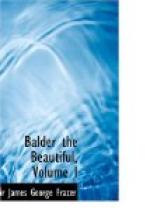her away from the camp to some secluded spot, where
she digs a circular hole in the sandy soil under the
shade of a tree. In this hole the girl squats
with crossed legs and is covered with sand from the
waist downwards. A digging-stick is planted firmly
in the sand on each side of her, and the place is
surrounded by a fence of bushes except in front, where
her mother kindles a fire. Here the girl stays
all day, sitting with her arms crossed and the palms
of her hands resting on the sand. She may not
move her arms except to take food from her mother or
to scratch herself; and in scratching herself she
may not touch herself with her own hands, but must
use for the purpose a splinter of wood, which, when
it is not in use, is stuck in her hair. She may
speak to nobody but her mother; indeed nobody else
would think of coming near her. At evening she
lays hold of the two digging-sticks and by their help
frees herself from the superincumbent weight of sand
and returns to the camp. Next morning she is
again buried in the sand under the shade of the tree
and remains there again till evening. This she
does daily for five days. On her return at evening
on the fifth day her mother decorates her with a waist-band,
a forehead-band, and a necklet of pearl-shell, ties
green parrot feathers round her arms and wrists and
across her chest, and smears her body, back and front,
from the waist upwards with blotches of red, white,
and yellow paint. She has in like manner to be
buried in the sand at her second and third menstruations,
but at the fourth she is allowed to remain in camp,
only signifying her condition by wearing a basket
of empty shells on her back.[103] Among the Kia blacks
of the Prosperine River, on the east coast of Queensland,
a girl at puberty has to sit or lie down in a shallow
pit away from the camp; a rough hut of bushes is erected
over her to protect her from the inclemency of the
weather. There she stays for about a week, waited
on by her mother and sister, the only persons to whom
she may speak. She is allowed to drink water,
but may not touch it with her hands; and she may scratch
herself a little with a mussel-shell. This seclusion
is repeated at her second and third monthly periods,
but when the third is over she is brought to her husband
bedecked with savage finery. Eagle-hawk or cockatoo
feathers are stuck in her hair: a shell hangs
over her forehead: grass bugles encircle her
neck and an apron of opossum skin her waist:
strings are tied to her arms and wrists; and her whole
body is mottled with patterns drawn in red, white,
and yellow pigments and charcoal.[104]
[Seclusion of girls at puberty in the islands of Torres Straits.]




